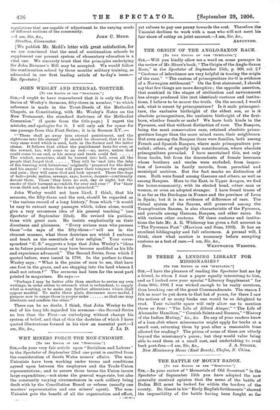THE ORIGIN OF THE ANGLO-SAXON RACE,.
[To TIIR EDITOR. ON THE "SPECTATOR.") SIR,—Will you kindly allow me a word on some passages in the review of Mr. Shore's book, "The Origin of the Anglo-Saxon Race," in the Spectator of September 15th, p. 369, col. 2 ? "Customs of inheritance are very helpful in tracing the origin of the race." "The custom of primogeniture itself is evidence of a Norwegian settlement." On the first statement, I should say that few things are more deceptive ; the opposite assertion, that mankind in like stages of civilisation and environment has always produced like (not identical) customs and institu- tions, I believe to be nearer the truth. On the second, I would ask, what is meant by primogeniture? Is it male primogeni- ture, the exclusive birthright of the eldest son, or is it absolute primogeniture, the exclusive birthright of the first- born, whether female or male ? We have both kinds in the Pyrenees, and that without distinction of race. The Basques, being the most conservative race, retained absolute primo- geniture longer than the more mixed races, their neighbours. But even among the Basques there were families, both among French and Spanish Basques, where male primogeniture pre- vailed; others, of equally high consideration, where absolute primogeniture prevailed. I have ascertained this, not only from books, but front the descendants of female heiresses whose brothers and uncles were excluded, from inspec- tion of lawsuits in family records, from parochial and municipal archives. But the fact marks no distinction of race. Both were found among Gaseous and others, as well as among Basques. More to the East, in Upper Aragon, we find the house-community, with its elected head, either man or woman, or even an adopted stranger. I have found traces of it as far as the Dordogne in France and the province of Leon in Spain; but it is no evidence of difference of race. The vicinal system of the Saxons, still preserved among the Transylvanian Saxons, is also characteristic of the Pyrenees, and prevails among Gaseous, Basques, and other races. So with various other customs. Of these customs and institu- tions the late Mr. A. R. Whiteway has given a full account in "The Pyrenean Past" (Harrison and Sons, 1903). It has an excellent bibliography and full references. A perusal will, I think, show what caution is necessary before accepting customs as a test of race.—I am, Sir, &c.,










































 Previous page
Previous page